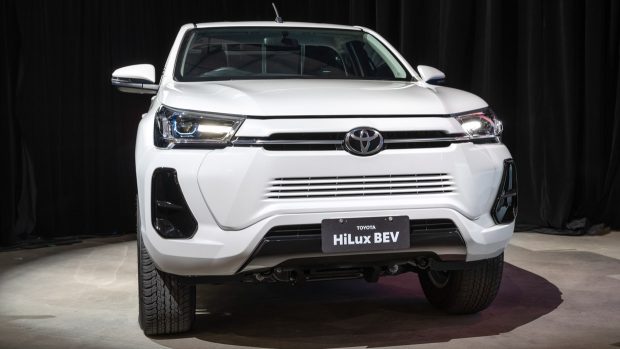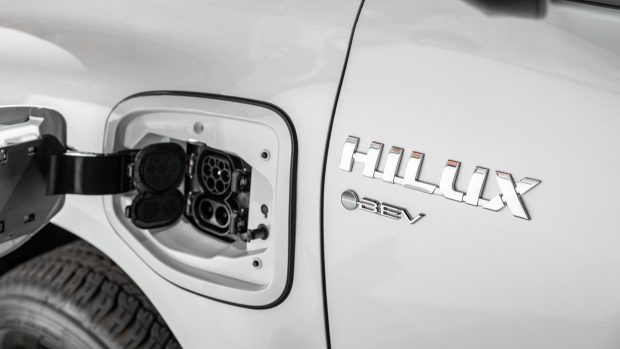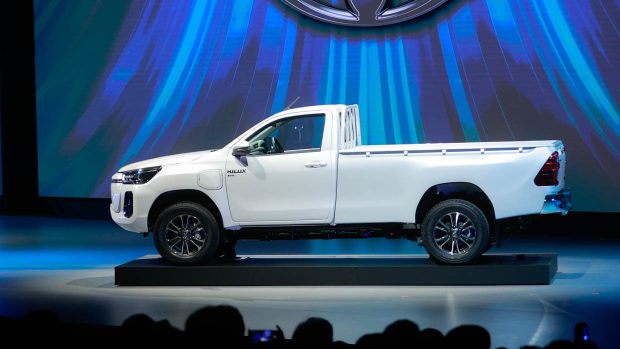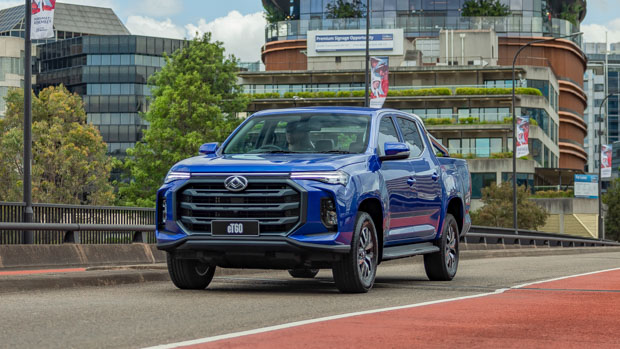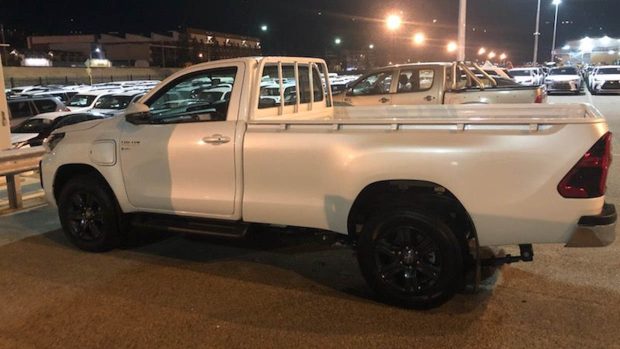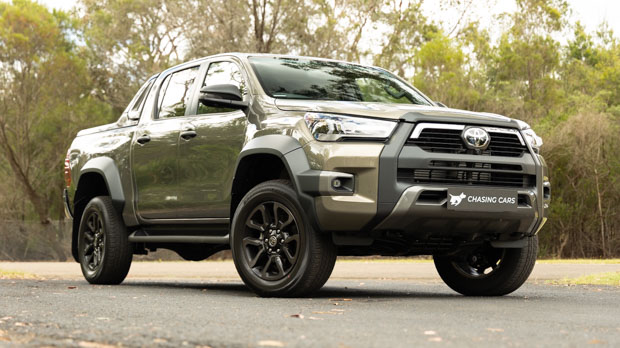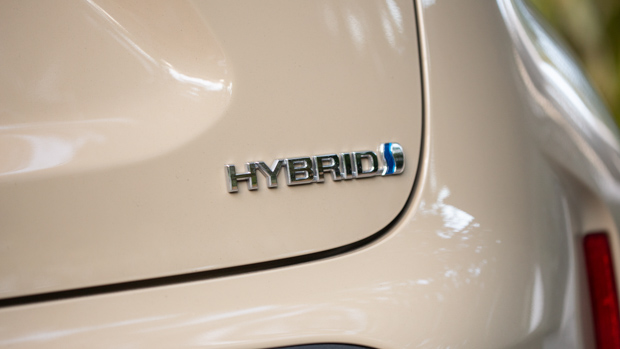-
Car Reviews
- All reviews
- Midsize SUVs
- Small cars
- Utes
- Small SUVs
- Large SUVs
- Large cars
- Sports SUVs
- Sports cars
- Vans
Latest reviews
- Car News
-
Car Comparisons
Latest comparisons
- Chasing Deals
City-focused 2WD ‘Hilux Revo’ battery EV ute is undergoing local testing with Toyota Australia stating it’s optimistic about a production model
It may only be a prototype, but the significance of Toyota showing a fully electric Hilux in Australia cannot be understated.
With a circa-64kWh battery and two-wheel drive, the Toyota Hilux Revo BEV Concept was unveiled this week at a Toyota Australia media event in Melbourne.
Toyota admits that the Hilux Revo, which is undergoing Australian testing, is a modest vehicle, but says it is a stepping stone towards an aim of releasing a Hilux dual-cab with zero tailpipe emissions and all of the capability of the current diesel ute.
On whipping covers off the Thailand-built HiLux Revo, Toyota Australia’s vice president of sales and marketing, Sean Hanley, declared it a “hugely important vehicle for Toyota, and for Australia.”
Hanley said the concept was a “masterpiece of technology, and a clear demonstration of how advanced we are in relation to BEVs (battery electric vehicles).”
But this electric Hilux isn’t for Australia, for now at least.
“What I can’t tell you is when, or even if, this car will make it to Australia as a production model,” said Hanley.
But Toyota Australia knows the appetite for electric pickups is mighty. Melbourne-based company Roev has reported between 500 and 1000 buyers for its third-party Hilux EV conversions in their first year on sale. Toyota will want a slice of the pie.
“What I can tell you is we’re optimistic,” Hanley continued. “We’d definitely pursue the opportunity to bring such a vehicle to our market in the future should it become available.”
This single-cab one-tonner is believed to be the same vehicle revealed in Thailand late last year, due for the South East Asian market.
“As you’d expect with a HiLux from Thailand, this Concept ute is a short-range, city focused BEV. It’s two-wheel-drive, with the battery that’s probably similar in capacity to a BZ4X,” said Hanley.
For that, we can read that the Hilux Revo uses the same battery as the BZ4X, which offers 64.0kWh of usable capacity.
In the midsize BZ4X SUV, Toyota claims a range of 516km in two-wheel drive format.
The Hilux would likely have higher energy consumption. At a Chasing Cars-estimated efficiency of 25.0kWh/100km, the Hilux Revo could deliver a range of 256km.
That’s in the ballpark of the sole electric ute currently on sale in Australia: the LDV eT60, which uses a larger 88.5kWh battery. That vehicle consumes 26.8kWh/100km to deliver a range of 330km.
But it’s a long way off today’s diesel Hilux, which consumes about 10.0L/100km. With its 80-litre fuel tank, the ICE Hilux delivers a real-world range of 800km.
While full details on the Hilux Revo remain unknown, we were told there’s a “swag of Toyota-own technology under the skin that we’re not ready to reveal today.”
The Revo’s doors were kept firmly locked so we couldn’t have a poke around inside, but through the window there were no obvious surprises: just a low-specification Hilux single cab, similar to an Australian-spec Workmate.
As we reported earlier this month, the Hilux Revo Concept has been spotted in Western Australia for local testing.
“Our local evaluation engineers have already been putting this very vehicle through its paces, and they’re impressed,” Hanley said.
As we also previously speculated, Toyota’s recently signed an memorandum of understanding (MoU) with mining giant BHP to “embrace solutions for lowering vehicle operation emissions.” A fleet of electric Hiluxes would certainly tick that box.
The sole electric ute on our market right now is the $92,990 LDV eT60 – a two-wheel-drive dual cab with only 330km range and tow rating of 1000kg.
Like the Hilux Revo Concept, it’s far more of a “city-focused BEV” than anything suited to off-roading, long-distance touring or towing anything of significant weight.
What Australians want is an electric pickup which closely matches the abilities of the current crop of turbo-diesel dual cabs.
“What I’m really hanging out for is exactly the same thing everyone’s asking the question about,” Hanley said. “A load-carrying, trailer-towing, remote area off-road Hilux 4×4 with zero tailpipe emissions. What a vehicle that would be.”
Then the words we want to hear: “And it’s possible.”
Going off-script, Hanley was asked if a range of 800km was a target for an electric HiLux for our market. “You’d certainly want it up there; people don’t want to compromise,” he said.
“In Australia, you’ve got to get there. Honestly, who is going to buy something that won’t tow, go off-road, or do that 800km?”
Hanley suggested hydrogen fuel cell rather than battery electric was a more realistic solution. “Hydrogen provides great range, it’s totally carbon neutral and it can tow. And it can handle big and heavy stuff.”
Contemplating a Hilux BEV for Australia, Hanley said we must comprehend the size, weight and charging time of the battery pack required to achieve a range of 800km – as you’d get from a diesel HiLux.
“Rest assured, Toyota is working on it,” Hanley said, citing Toyota’s work on solid state batteries as a solution. That, or how hydrogen fuel cells could come into their own.
“The brand has long championed hydrogen fuel cell tech, witnessed with its Mirai passenger car, now in its second generation.
“The hydrogen horizon I think is around 2030, 2035,” Hanley said. “Only because of infrastructure, not necessarily because of technology.”
In the UK, Toyota is in the process of developing a hydrogen-powered Hilux prototype, using the Mirai’s fuel-cell technology. “It wouldn’t surprise me if this becomes the vehicle that bridges that gap between today’s realities and tomorrow’s technological requirements,” Hanely said.
We were told the first prototype hydrogen Hilux vehicles are being produced this year, with the view for preparing for small series production.
Latest news
About Chasing cars
Chasing Cars reviews are 100% independent.
Because we are powered by Budget Direct Insurance, we don’t receive advertising or sales revenue from car manufacturers.
We’re truly independent – giving you Australia’s best car reviews.
